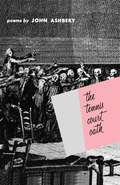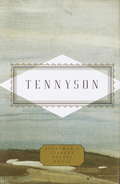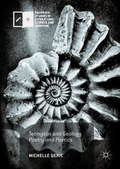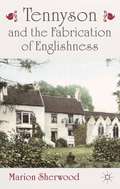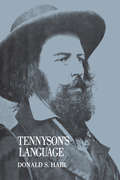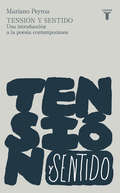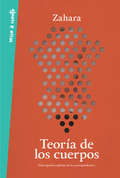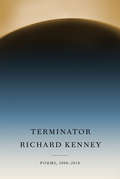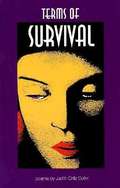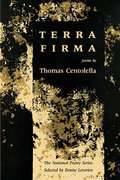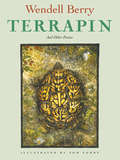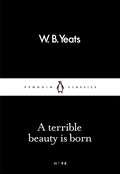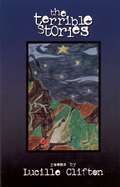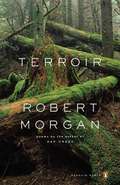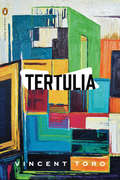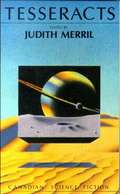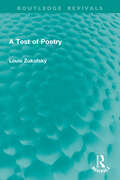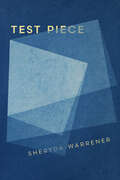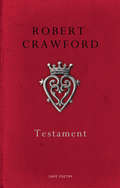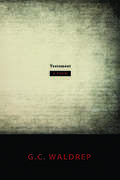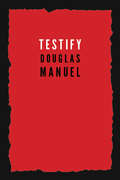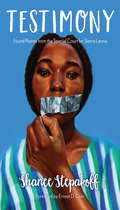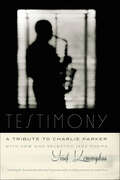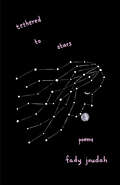- Table View
- List View
The Tennis Court Oath: A Book of Poems (Wesleyan Poetry Program)
by John AshberyJohn Ashbery writes like no one else among contemporary American poets. In the construction of his intricate patterns, he uses words much as the contemporary painter uses form and color- words painstakingly chosen as conveyors of precise meaning, not as representations of sound. These linked in unexpected juxtapositions, at first glance unrelated and even anarchic, in the end create by their clashing interplay a structure of dazzling brilliance and strong emotional impact. From this preoccupation arises a poetry that passes beyond conventional limits into a highly individual realm of effectiveness, one that may be roughly likened to the visual world of Surrealist painting. Some will find Mr. Ashbery's work difficult, even forbidding; but those who are sensitive to new directions in ideas and the arts will discover here much to quicken and delight them.A 35th anniversary edition of classic work from a celebrated American poet who has received the Pulitzer Prize, the national Book Award, and the national Book Critics Circle Award. John Ashbery's second book, The Tennis Court Oaths, first published by Wesleyan in 1962, remains a touchstone of contemporary avant-garde poetry.
Tennyson: Poems
by Alfred Lord TennysonAlfred, Lord Tennyson was a more complex writer than his status as Queen Victoria's favorite poet might suggest. Though capable of rendering rapture and delight in the most exquisite verse, in another mode Tennyson is brother in spirit to Poe and Baudelaire, the author of dark, passionate reveries. And though he treasured poetic tradition, his work nevertheless engaged directly with the great issues of his time, from industrialization and the crisis of faith to scientific progress and women's rights. A master of the short, intense lyric, he can also be sardonic, humorous, voluptuous, earthy, and satirical.This collection includes, of course, such famous poems as "The Lady of Shalott" and "The Charge of the Light Brigade." There are extracts from all the major masterpieces--"Idylls of the King," "The Princess," "In Memoriam"--and several complete long poems, such as "Ulysses" and "Demeter and Persephone," that demonstrate his narrative grace. Finally, there are many of the short lyrical poems, such as "Come into the Garden, Maud" and "Break, Break, Break," for which he is justly celebrated.
Tennyson and Geology: Poetry and Poetics (Palgrave Studies in Literature, Science and Medicine)
by Michelle GericThis book offers new interpretations of Tennyson's major poems along-side contemporary geology, and specifically Charles Lyell's Principles of Geology (1830-3). Employing various approaches - from close readings of both the poetic and geological texts, historical contextualisation and the application of Bakhtin's concept of dialogism - the book demonstrates not only the significance of geology for Tennyson's poetry, but the vital import of Tennyson's poetics in explicating the implications of geology for the nineteenth century and beyond. Gender ideologies in The Princess (1847) are read via High Miller's geology, while the writings of Lyell and other contemporary geologist, comparative anatomists and language theorists are examined along-side In Memoriam (1851) and Maud (1855). The book argues that Tennyson's experimentation with Lyell's geology produced a remarkable 'uniformitarian' poetics that is best understood via Bakhtinian theory; a poetics that reveals the seminal role methodologies in geology played in the development of divisions between science and culture, and that also, quite profoundly, anticipates the crisis in language later associated with the linguistic turn of the twentieth century.
Tennyson and the Fabrication of Englishness
by Marion SherwoodThrough an examination of Tennyson's 'domestic poetry' - his portrayals of England and the English - in their changing nineteenth-century context, this book demonstrates that many of his representations were 'fabrications', more idealized than real, which played a vital part in the country's developing identity and sense of its place in the world.
Tennyson's Language
by Donald S. HairThe study of language was central to the thinking of Tennyson and his circle of friends. The period of his education was a time of interest in the subject, as a new form of philology became widely known and accepted in Britain. In this study, Donald S. Hair discusses Tennyson's own view of language, and sets them in the context of the language theories of his day.The scope of the book is broad. Hair draws upon a wide range of Tennyson's poetry, from a quatrain he wrote at the age of eight to an 'anthem-speech' he wrote at the age of eighty-two, and pays particular attention to two major works: In Memoriam and Idylls of the King.He explores these in relation to the two theoretical traditions Tennyson inherited. One is derived from Locke and the language theory set out in Book III of An Essay Concerning Human Understanding, the other from Coleridge and the language theory of what Mill called the 'Germano-Coleridgian' tradition. He goes back to Plato's Cratylus and Aristotle's On Interpretation, and forward to the continental philology introduced into England by Tennyson's friends, Kemble and Trench, among others. Finally, he links Tennyson's language to thinkers such as Whewell, Hallam, and Maurice, who are not in themselves philologists but who make language part of their concerns--and Whewell was Tennyson's tutor, Hallam and Maurice his friends.Hair offers a significant contribution to the development of linguistic theory in Britain while also providing some close readings of key passages of Tennyson's work and examinations of the poet's faith and views of society.
Tensión y sentido
by Mariano Peyrou Tubert«Siempre que leemos un buen poema, por muy acostumbrados que estemos a leer poesía, sentimos esa tensión; podemos aprender a disfrutarla.» Este libro no es un manual, pero logra que el lector, de un modo natural, sutil y un tanto inesperado, descubra y aprenda a emplear sus propios recursos para abordar un poema (y se libere de ciertas trabas). Tampoco es una historia de la poesía, pero en él lo contemporáneo se conecta con una larga tradición que abarca diversas disciplinas artísticas, de modo que vemos con nuevos ojos tanto lo antiguo como lo moderno. ¿Qué ocurre cuando el sentido se abre, cuando conviven la precisión y la imprecisión, cuando irrumpe lo prosaico? ¿Cómo participan la ironía, la debilidad temática, las repeticiones, las imágenes o los símbolos en la construcción del sentido? Mariano Peyrou nos invita a disfrutar de la tensión de explorar un territorio extraño, a entregarnos a la fascinación que genera esa extrañeza y a encontrar un espacio desde el que leer, mirar y pensar de forma diferente. En el camino, una cuidada selección de poemas (de Baudelaire, Dickinson, Eliot, Stevens, Parra, Szymborska o Ullán, pero también de Shakespeare, Góngora o Blake) ilustra las distintas dimensiones exploradas. Pero los poemas, conectados con numerosos ejemplos provenientes de otras disciplinas (Duchamp, El Veronés, Beethoven, Stravinski, Darwin o Freud también están en estas páginas), son sobre todo el terreno ideal para que el lector se deleite estrenando su nueva mirada. Reseñas:«Libro a libro, ha renovado los modos del lenguaje y los enfoques de la mirada de una obra poética y narrativa tan personal como extrañamente prodigiosa.»Antonio Ortega, Babelia «Esas raras veces en que el ingenio se acompaña de sustancia, el resultado puede ser fascinante. En ese momento es cuando yo dejo de llamarlo "ingenio" y lo llamo "talento".»Sara Mesa, Estado Crítico «Su sentido del humor y su controlado gusto por la broma lingüística adquieren un feliz tono propio.»Nadal Suau, El Cultural «Innovador, ácido, lúdico, lúcido.»Ángeles López, La Razón «Uno de nuestros grandes poetas del lenguaje.»Vicente Luis Mora, Diario de Lecturas «Mariano Peyrou me parece un excelente escritor.»José María Guelbenzu «Una de las escrituras más personales y sorprendentes del panorama actual.»Luis Bagué Quílez, Babelia «Uno de los narradores españoles más inteligentes en el juego con el lenguaje.»Eugenio Fuentes, La Nueva España «Dan ganas de anunciarle al lector que esto no es una novela. ¿Y esto es bueno o malo? En el caso del autor madrileño, es bueno. Muy bueno. Endiabladamente inteligente.»J. Ernesto Ayala-Dip, Babelia, sobre Los nombres de las cosas «Son muchas las cuestiones existenciales y artísticas que plantea De los otros. Impulsada por un estilo introspectivo, con derivas en el flujo de la conciencia y diálogos con frases inconclusas. Peyrou sobrecoge al lector.»Francisco Solano, Babelia «Peyrou da rienda suelta a su aventura lingüística sin que la vanguardia desemboque jamás en gratuidad.»Juan Andrés García Román, Babab «No es una novela de humor, y sin embargo es divertida como pocas que haya leído en los últimos años.»Juan Marqués, La Esfera de Papel, sobre Los nombres de las cosas
Teoría de los cuerpos: Descripción explícita de la correspondencia
by ZaharaTeoría de los cuerpos es un análisis poético de las maneras de relacionarnos que tenemos los seres humanos: cuerpos que se mueven, se repelen y se imantan con sus iguales por razones a veces difíciles de comprender. «Intenté entender qué nos sucedía desde todos los ángulos posibles. Observé el ansia, la espera, el deseo, la tristeza, el vacío. La carne, áspera a veces, rugosa; el pulso caliente, la búsqueda a toda costa. »Reconozco que allí no había respuestas. Encontré otras vidas dentro de un solo cuerpo y cómo su relación con los otros condicionaba su propia existencia. Así a veces se sentía sustraído, partido o en expansión con ellos. »Busqué dentro lo que siempre había sentido fuera. Tuve que abrirme con mis propias manos, dejar que otras también lo hicieran. Y solo cuando atravesé el dolor y la nostalgia, el placer y la soberbia, descubrí que lo que había ahí enterrado era real, que absolutamente todo era cierto.»Zahara _____________ A través de poemas, textos más narrativos y semaforismos, la cantante y escritora Zahara demuestra una vez más que el talento no se compartimenta. Crea, a través de este poemario dividido en tres partes («Clausuras de un cuerpo», «Correspondencias de los cuerpos» y «Extensión de un cuerpo»), su propia interpretación de la teoría matemática de los cuerpos, que estudia sus propiedades. Un libro que sorprende por su originalidad y su calidad y que, al mismo tiempo, contiene todos los ingredientes a los que ella nos tiene acostumbrados y que tanto nos gustan: su humor, un toque de surrealismo, el exceso, el amor, el dolor, el deseo e incluso la náusea, mezclados y agitados en su justa medida. De Trabajo, piso, pareja se ha dicho...«Hay debuts literarios que logran sorprender a propios y extraños. Da igual que ya conocieras la faceta musical de Zahara: no estás preparado para Trabajo, piso, pareja, un fresco íntimo sobre la vida de una relación que actúa como un diagnóstico íntimo de algunas patologías generacionales.»Revista GQ «Un certero retrato generacional de los anhelos y las decepciones de los treintañeros.».El Confidencial «Un relato a dos voces sobre la conciliación romántica y profesional en una época en la que está mal visto enamorarse, en la que el trabajo es la prioridad y el desapego familiar la norma. Todo envuelto en el papel de una sociedad en la que sostener en pie una relación es más difícil que conseguir que un castillo de naipes sobreviva a una ligera brisa.»Vogue
Teoría de los cuerpos: Descripción explícita de la correspondencia
by ZaharaTeoría de los cuerpos es un análisis poético de las maneras de relacionarnos que tenemos los seres humanos: cuerpos que se mueven, se repelen y se imantan con sus iguales por razones a veces difíciles de comprender. «Intenté entender qué nos sucedía desde todos los ángulos posibles. Observé el ansia, la espera, el deseo, la tristeza, el vacío. La carne, áspera a veces, rugosa; el pulso caliente, la búsqueda a toda costa. »Reconozco que allí no había respuestas. Encontré otras vidas dentro de un solo cuerpo y vi cómo su relación con los otros condicionaba su propia existencia. Así a veces se sentía sustraído, partido o en expansión con ellos. »Busqué dentro lo que siempre había sentido fuera. Tuve que abrirme con mis propias manos, dejar que otras también lo hicieran. Y solo cuando atravesé el dolor y la nostalgia, el placer y la soberbia, descubrí que lo que había ahí enterrado era real, que absolutamentetodo era cierto.»Zahara _____________ A través de poemas, textos más narrativos y semaforismos, la cantante y escritora Zahara demuestra una vez más que el talento no se compartimenta. Crea, a través de este poemario dividido en tres partes («Clausuras de un cuerpo», «Correspondencias de los cuerpos» y «Extensión de un cuerpo»), su propia interpretación de la teoría matemática de los cuerpos, que estudia sus propiedades. Un libro que sorprende por su originalidad y su calidad y que, al mismo tiempo, contiene todos los ingredientes a los que ella nos tiene acostumbrados y que tanto nos gustan: su humor, un toque de surrealismo, el exceso, el amor, el dolor, el deseo e incluso la náusea, mezclados y agitados en su justa medida. De Trabajo, piso, pareja se ha dicho...«Hay debuts literarios que logran sorprender a propios y extraños. Da igual que ya conocieras la faceta musical de Zahara: no estás preparado para Trabajo, piso, pareja, un fresco íntimo sobre la vida de una relación que actúa como un diagnóstico íntimo de algunas patologías generacionales.»Revista GQ «Un certero retrato generacional de los anhelos y las decepciones de los treintañeros.».El Confidencial «Un relato a dos voces sobre la conciliación romántica y profesional en una época en la que está mal visto enamorarse, en la que el trabajo es la prioridad y el desapego familiar la norma. Todo envuelto en el papel de una sociedad en la que sostener en pie una relación es más difícil que conseguir que un castillo de naipes sobreviva a una ligera brisa.»Vogue
Terminator: Poems, 2008-2018
by Richard KenneyLove, science, and politics collide in this sharp assessment of who we are now, in a generous selection of work by the award-winning poet.The terminator--the line, perpendicular to the equator, that divides night from day--is the organizing concept for this collection, which examines a world where "pert, post-apocalyptic / entertainment trades have trod the pocked / planet raw." Kenney's division of light verse from darker poems serves to remind us that what makes us laugh is often dead serious, and what's most serious can be best understood through wordplay, an ironic eye, the cleaving and joining magically effected by metaphor. With grace and candor, Richard Kenney thumbs through our troubles like a precious but scratched collection of vinyl: "the nature of emotion's analog, while languages are digital." From "Siri, Why Do I Wear a Necktie?" to the eternal springing of love ("Magnetic swipe to the blinking lock / is me to you"), Kenney reminds us that art's the best weapon to maintain our wits in very challenging times.
Terms of Survival: Poems
by Judith Ortiz CoferA cultural legacy and a woman's desire "to be released from rituals" -- are the terms that Cofer confronts in her poetic dialectic of survival. Cultural icons, customs and rites of passage take root in an imagery that is lush, tropical and piercing.
Terra Firma
by Thomas CentolellaThomas Centolella writes about appreciating everyday wonders in the urban and forested settings of the Bay Area and San Francisco while remniscing about his forefathers in the Old World.
Terrapin: And Other Poems
by Wendell BerryTom Pohrt spent years gathering those poems of Wendell Berry's he imagined children might read and appreciate, making sketches to accompany his selection. <P><P>Over the past several years a dialogue has evolved in which the poet has come to advise the illustrator on the natural history of the animals and plants seen so intimately in the poems. Then came the august book designer Dave Bullen, who has been designing the books of Wendell Berry for more than thirty years.The resulting volume of 21 poems includes dozens of the sketches, drawings and watercolors in what amounts to a visual meditation on the poem they work to illustrate and is simply staggering in both its beauty and its meaning to those of us who remain lovers of the book as physical object.In the full-color Terrapin we have not only a volume of staggering beauty but a consummate example of the collaborative effort that is fine bookmaking, the perfect gift for children, grandchildren or anyone who remains a lover of the book as physical object.
A Terrible Beauty Is Born (Penguin Little Black Classics)
by W B Yeats'But I, being poor, have only my dreams; / I have spread my dreams under your feet...'By turns joyful and despairing, some of the twentieth century's greatest verse on fleeting youth, fervent hopes and futile sacrifice.
The Terrible Stories
by Lucille CliftonThe long-awaited tenth collection of poetry from the Shelley Memorial Prize-winning poet Lucille Clifton.
Terroir
by Robert MorganThe first full-length collection in more than a decade from the award-winning poet and author of the bestselling novel Gap Creek. Robert Morgan has won acclaim for sonorous poems rooted in his native Blue Ridge Mountains that feature taut, forceful, often haunting imagery and carefully chiseled phrases. The poems in Terroir build on his earlier work but reach out in several new directions, exploring memory, family narratives, the natural world of trees and forest animals, and the poetry of work. Readers of Morgan's fiction will recognize many places, themes, and voices, while fans of his poetry will see a fresh energy in poems drawing on science and folklore, Native American history, and music. These elegantly written poems celebrate everything from the bonds of friendship and community to the fleeting sparkle of a drop of rain, discovering wonder in the local and familiar, the sacred in the everyday.
Tertulia (Penguin Poets)
by Vincent ToroA fluid, expansive new collection from a poet whose work "dazzles with [an] energetic exploration of the Puerto Rican experience in the new millennium" (NBC News)Puerto Rican poet Vincent Toro's new collection takes the Latin American idea of an artistic social gathering (the "tertulia") and revises it for the Latinx context in the United States. In verses dense with juxtaposition, the collection examines immigration, economics, colonialism and race via the sublime imagery of music, visual art, and history. Toro draws from his own social justice work in various U.S. cities to create a kaleidoscopic vision of the connections between the personal and the political, the local and the global, in a book that both celebrates and questions the complexities of the human condition.
Tesseracts
by Judith MerrilEach year Tesseract Books chooses a team of editors from among the best of Canada's writers, publishers and critics to select innovative and futuristic fiction and poetry from the leaders and emerging voices in Canadian speculative fiction. This is the anthology that started it all! Featuring fiction by Elisabeth Vonarburg and Hugo and Nebula award winning authors Spider Robinson, and William Gibson.
A Test of Poetry (Routledge Revivals)
by Louis ZukofskyA Test of Poetry (1932) is a comparative study of poetry from Homer to the twentieth century. By giving several translations of the same passage from Homer, an elegy of Ovid and lines from Herrick which read like an adaptation of Ovid, or a fifteenth century poem about a cock and a recent poem about chickens, and so on, a means for judging the values of poetic writing is established. The book also has a comparative chronological chart, including a summary of critical views.
Test Piece
by Sheryda WarrenerWays of Seeing meets Mary Ruefle in these visual-art-inflected poems Though they started from Sheryda Warrener’s impulse to see herself more clearly, the poems in Test Piece ended up becoming more expansive meditations on seeing and vision. They engage with the process and practice of art-making, and specifically with abstract minimalist works like those by Eva Hesse, Anne Truitt, Ruth Asawa, and Agnes Martin. Not-seeing/not-knowing is a motif, as is weave, grid, pattern, rhythm of interiors, domestic life. These poems are informed by collage, by the act of bringing images and lines together. With their echoes and reverberations (hand, mirror, body, clear, form, face), a greater complexity is revealed. "In conversation with visual art, mirrors, and the traces of self we assemble through encounter, Sheryda Warrener’s Test Piece holds an expansive place to dwell with the phenomenological. Interacting with event and object, reflection and parataxis, the writing asks us to consider contingent spaces and the matter of matter and meaning making. The poems adhere as arrangement, as a consideration of relationality. 'What does she whimper in the dog’s ear? / How earthly we behave, believing we’re alone.'" – Hoa Nguyen, author of A Thousand Times You Lose Your Treasure "Sheryda Warrener's newest poetry collection unspools as a complex weave of repeated motifs, ritualistic gestures, and deeply embodied observations. I’m especially struck by the influence of twentieth-century women artists within the collection: meditations on Eva Hesse, Agnes Martin, and Sherrie Levine’s works structure much of Test Piece. Palimpsests of photographed interiors, where living and writing collide lyrically and randomly, combine with floating textual cut-ups of variegating transparency. This concretizes, perhaps, how the poems bloom forth from experimental assemblage: 'her body holds/the long blue sentence of it…'" – Marina Roy, artist and author of Queuejumping
Testament
by Robert CrawfordTo make a testament is to attempt to pass on what matters most. In his seventh full-length collection of poems Robert Crawford writes of love, loss, belief, and commitment. Whether in intimate erotic lyrics or in a sustained engagement with the politics of Scottish independence he writes with passion, wit, and assurance about struggles to pass on values and treasures. The book opens with a sequence of love poems, and closes with ‘Testament’, a startlingly fresh gathering of deftly rhymed paraphrases based on the New Testament. Whether making versions of Cavafy or elegising fellow poet Mick Imlah, or writing how a father hands on a piece of marble to his son, Robert Crawford shows in Testament how poetry can communicate from generation to generation aspects of what makes us most vulnerably and engagingly human.
Testament
by G.C. WaldrepIn this book-length poem, G.C. Waldrep addresses matters as diverse as Mormonism, cymatics, race, Dolly the cloned sheep, and his own life and faith. Drafted over twelve trance-like days while in residence at Hawthornden Castle, Waldrep responds to such poets as Alice Notley, Lisa Robertson, and Carla Harryman, and tackles the question of whether gender can be a lyric form.G.C. Waldrep's books include Disclamor (BOA Editions Ltd., 2007) and Your Father on the Train of Ghosts (BOA Editions, Ltd., 2011). He lives in Lewisburg, Pennsylvania, where he teaches at Bucknell University, edits West Branch, and serves as editor-at-large for the Kenyon Review.
Testify
by Douglas ManuelThis award-winning debut book of poetry examines race, masculinity, religion, class, and the African American experience in the American Midwest.A book of elegiac ambivalence, Testify&’s speaker often finds himself trapped between received binaries: black and white, ghetto and suburban, atheism and Catholicism. In many ways, this work is a Bildungsroman detailing the maturation of a black man raised in the crack-laden 1980s, with hip-hop, jazz, and blues as its soundtrack. Rendered with keen attention to the economic decline of the Midwest due to the departure of the automotive industry, this book portrays the speaker wrestling with his city&’s demise, family relationships, interracial love, and notions of black masculinity. Never letting anyone, including the speaker, off the hook, Testify refuses sentimentality and didacticism and dwells in a space of uncertainty, where meaning and identity are messy, complicated, and multivalent.&“Manuel charts the raw emotional complexities and the impossible daily reckonings that confront a young black man coming of age today in America. . . . Each powerful testimony in this collection stands as evidence of an eloquent and dramatic new voice in American poetry.&” ―David St. John, author of The Auroras and Study for the World&’s Body &“These potent poems testify to those ambivalent moments that might rend or right us, as when an interracial couple drive past a truck with a Confederate flag painted on its back windshield and from which a little boy turns to smile and wave: his &‘blond hair // split down the middle like a Bible / left open to the Book of Psalms.&’&” ―Anna Journey, author of The Atheist Wore Goat Silk
Testimony: Found Poems from the Special Court for Sierra Leone (The Griot Project Book Series)
by Shanee StepakoffSierra Leone’s devastating civil war barely caught the attention of Western media, but it raged on for over a decade, bringing misery to millions of people in West Africa from 1991 to 2002. The atrocities committed in this war and the accounts of its survivors were duly recorded by international organizations, but they run the risk of being consigned to dusty historical archives. Derived from public testimonies at a UN-backed war crimes tribunal in Freetown, this remarkable poetry collection aims to breathe new life into the records of Sierra Leone’s civil war, delicately extracting heartbreaking human stories from the morass of legal jargon. By rendering selected trial transcripts in poetic form, Shanee Stepakoff finds a novel way to communicate not only the suffering of Sierra Leone’s people, but also their courage, dignity, and resilience. Her use of innovative literary techniques helps to ensure that the voices of survivors are not forgotten, but rather heard across the world. This volume also includes an introduction that explores how the genre of “found poetry” can serve as a uniquely powerful means through which writers may bear witness to atrocity. This book’s unforgettable excavation and shaping of survivor testimonies opens new possibilities for speaking about the unspeakable.
Testimony, A Tribute to Charlie Parker: With New and Selected Jazz Poems (Wesleyan Poetry Series)
by Yusef KomunyakaaPulitzer Prize–winning poet Yusef Komunyakaa is well known for his jazz poetry, and this book is the first to bring together the verve and vitality of his oeuvre. The centerpiece of this volume is the libretto "Testimony." Paying homage to Charlie Parker, "Testimony" was commissioned for a radio drama with original music by eminent Australian composer and saxophonist Sandy Evans. Remarkably rich and evocative, encompassing a wide range of musical energy and performers, this moving affirmation of Parker's genius became a milestone in contemporary radio theater. Twenty-eight additional poems spanning the breadth of Komunyakaa's career are included, including two never previously published. Accompanying the poems are interviews and essays featuring Komunyakaa, Evans, radio producer Christopher Williams, jazz critic Miriam Zolin, jazz writer and editor Sascha Feinstein, and musical director, Paul Grabowsky. Sascha Feinstein writes the foreword. The print edition includes two CDs with the entire Australian Broadcast Company recording of Testimony, ebook contains imbedded audio. Check for the online reader's companion at testimony.site.wesleyan.edu.
Tethered to Stars: Poems
by Fady JoudahA collection born of polyphony and the rhythms of our cosmos—intimate in its stakes, celestial in its dreams.Tethered to Stars inhabits the deductive tongue of astronomy, the oracular throat of astrology, and the living language of loss and desire. With an analytical eye and a lyrical heart, Fady Joudah shifts deftly between the microscope, the telescope, and sometimes even the horoscope. His gaze lingers on the interior space of a lung, on a butterfly poised on a filament, on the moon temple atop Huayna Picchu, on a dismembered live oak. In each lingering, Joudah shares with readers the palimpsest of what makes us human: “We are other worms / for other silk roads.” The solemn, the humorous, the erotic, the transcendent—all of it, in Joudah’s poems, steeped in the lexicon of the natural world. “When I say honey,” says one lover, “I’m asking you whose pollen you contain.” “And when I say honey,” replies another, “you grip my sweetness / on your life, stigma and anthophile.” Teeming with life but tinged with a sublime proximity to death, Tethered to Stars is a collection that flows “between nuance and essentialization,” from one of our most acclaimed poets.
